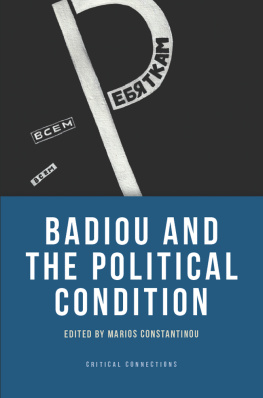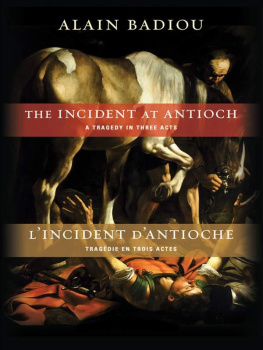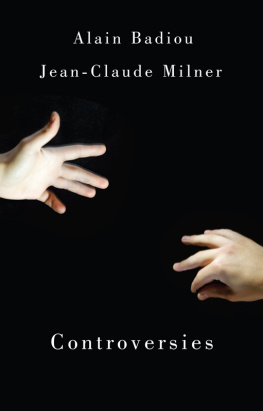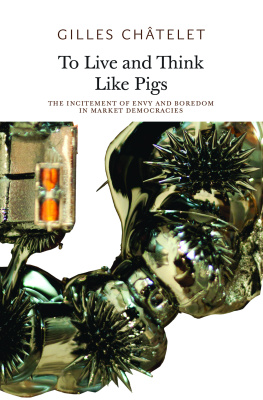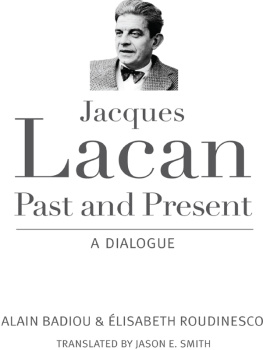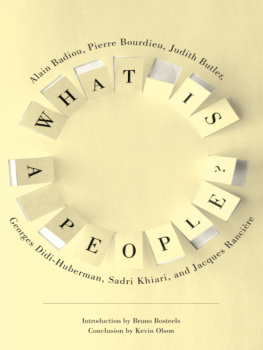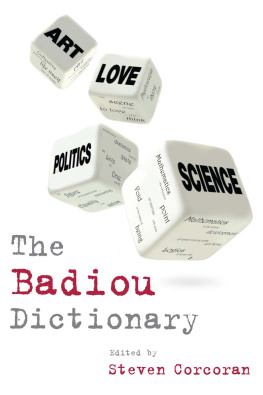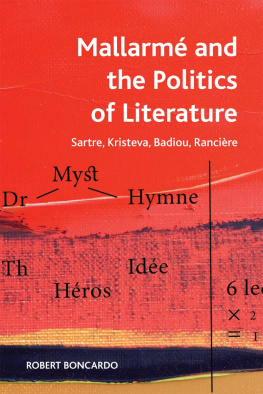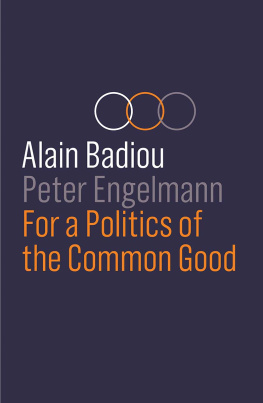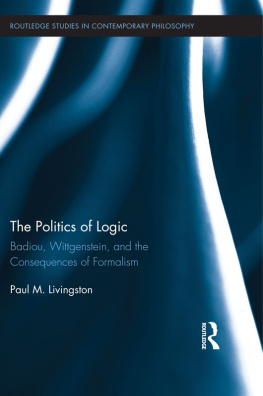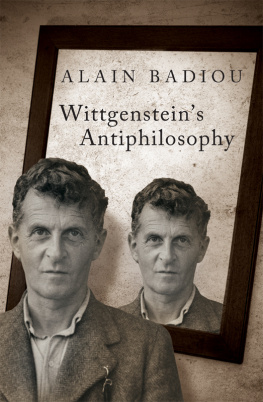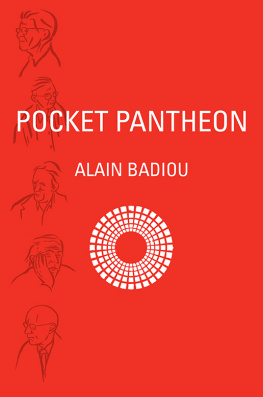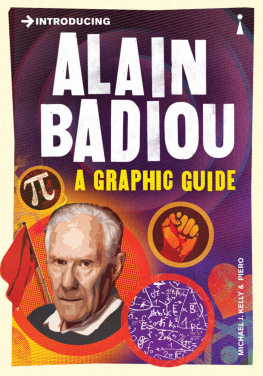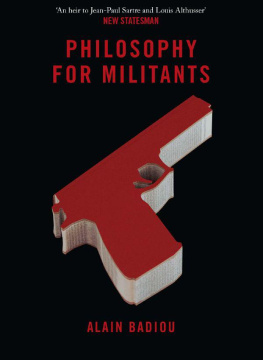Badiou and the Political Condition
Critical Connections
A series of edited collections forging new connections between contemporary critical theorists and a wide range of research areas, such as critical and cultural theory, gender studies, film, literature, music, philosophy and politics.
Series Editors
Ian Buchanan, University of Wollongong
James Williams, University of Dundee
Editorial Advisory Board
Nick Hewlett
Gregg Lambert
Todd May
John Mullarkey
Paul Patton
Marc Rlli
Alison Ross
Kathrin Thiele
Frdric Worms
Titles available in the series
Badiou and Philosophy, edited by Sean Bowden and Simon Duffy
Agamben and Colonialism, edited by Marcelo Svirsky and Simone Bignall
Laruelle and Non-Philosophy, edited by John Mullarkey and Anthony Paul Smith
Virilio and Visual Culture, edited by John Armitage and Ryan Bishop Rancire and Film, edited by Paul Bowman
Stiegler and Technics, edited by Christina Howells and Gerald Moore
Badiou and the Political Condition, edited by Marios Constantinou
Forthcoming titles
Butler and Ethics, edited by Moya Lloyd
Nancy and the Political, edited by Sanja Dejanovic
Visit the Critical Connections website at
www.euppublishing.com/series/crcs
Badiou and the Political Condition
Edited by Marios Constantinou
EDINBURGH
University Press
editorial matter and organisation Marios Constantinou, 2014
the chapters their several authors, 2014
Edinburgh University Press Ltd
22 George Square, Edinburgh EH8 9LF
www.euppublishing.com
Typeset in 11/13 Adobe Sabon by
Servis Filmsetting Ltd, Stockport, Cheshire,
and printed and bound in Great Britain by
CPI Group (UK) Ltd, Croydon CR0 4YY
A CIP record for this book is available from the British Library
ISBN 978 0 7486 7879 2 (hardback)
ISBN 978 0 7486 7880 8 (paperback)
ISBN 978 0 7486 7881 5 (webready PDF)
ISBN 978 0 7486 7882 2 (epub)
The right of the contributors to be identified as Author of this work has been asserted in accordance with the Copyright, Designs and Patents Act 1988, and the Copyright and Related Rights Regulations 2003 (SI No. 2498).
Contents
To Ellipolis, my daughter, for having realised prematurely the distinction between politico and diplomatico. I hope one day she with her friends will be able to resolve the crisis of witnessing so much stupidity in their lives.
Preface
This book rethinks the singularity of the political condition in the wake of Badious philosophical rupture. By way of genealogical investigations, expositions and reactualisations, the present collection of essays retraces the intellectual strands and intensities of thought that weave together the Badiouian political knot. These range from Epicurean materialism and Platonic communism to Xenophons philosophic warriorship as anti-imperial thought in action; from Paulian universalism and Pascalian existentialism to Rousseauean republicanism, Marxian anthropology and Wagners aristocratic populism; from Althussers neo-Epicurean materialism and Maoist anti-imperialism to Lacanian psychoanalysis and militant musicology; from the aesthetic vanguards to May 68, and from the Cultural Revolution to the politics of the love-event. This manifold constellation of Badious political thought, patiently and incisively examined, casts new light on the singularity of the political condition after the return of the subject as a novel philosophical concept and militant wager.
Moreover, this book assesses the political import of Badious philosophical challenge in the light of the current imperial impasse in southern Europe and the contradictory awakening of History in the Middle East and the eastern Mediterranean. A cohort of established scholars and rising theorists of the Badiou-effect engage the critical question of how to transmit the exception politically, at the intersection of contemporary anti-imperial polemics and debates that strike at the heart of the postmodern condition (Lyotard), deconstruction (Derrida), psychoanalysis (Lacaniek), biopolitics (Hardt and Negri) and pedagogy (Rancire).
In terms of its general conceptualisation, the theoretical praxis of this book adheres closely to the political knot that ties beingto thinking, that commits and obliges philosophy to think truth under the condition of the political event, while at the same time restraining this condition in the name of the philosophical truth of politics: justice and equality. This mutual conditioning in terms of a thinking praxis cum politics is never even. It remains discontinuous, contingent and haphazard. In so far as the political event appears as an exception, as the rare flash of a supplement destined to disappear soon after, then there is no royal conceptual road that leads to its recovery. The exceptionality and greatness of the political event, its very rarity, make it vulnerable to the nihilistic temptation to renominate it at any cost from the Left or, instead, to manipulate it sophistically from the Right through the construction of a light empire of interchangeable simulations. Hence, the restraining of Left as well as Right deviations, in their mutual substitution, becomes the main task of a political investigation that surveys the consequences of an egalitarian maxim in Badious sense.
However, this balancing or restraining act is speculative in its own right. It exudes a peculiar prudence which is perhaps already obsolete in the ordo-liberal age of creative destruction, the principal method of orgiastic capitalist experimentation with sociocidal newness at any cost! In fact, the ordo-liberal revolution operates on a double register. This operation involves on the one hand the reality principle of police, economic administration, simulated competition-law, forcing monopolies to act as if they were subject to fair competition, as if they did not enjoy special prerogatives and monopoly power; and on the other hand the register of behaviouristic conditioning through the successive shock-effects of novel destruction and radical economic bio-engineering.
If, as Badiou argues in his contribution to this volume, the twenty-first century will have been the realised end of the messianic age of revolutions, if this century will have been a century whose master name will not be that of revolution, then it is right to wonder whether this is not yet another suture which, by virtue of sheer necessity, subordinates philosophy to the post-revolutionary politics of immobilisation; or whether, indeed, any egalitarian hypothesis can be sustained at all, amid so much paralysing confusion, undecidability and neutralisation of politics, coupled with a proleptic disenactment of its revolutionary possibility. Given the homicidal mood of imperial bio-economics and its vanguard potlatch aesthetic of unrestrained creative destruction, any prolepticrevocation of the revolutionary possibility of politics may imply its total disavowal rather than its recommencement. I am also not certain that Badiou abides consistently by the consequences of this declaration. It cedes too much scope to the simulational capacity of obscure politics that he so vehemently and rightly opposes, namely, the biopolitics of non-governmental grassroots, imperialist internationalism, neoliberal radicalism and the fundamentalist repetitions of religious doctrines.

